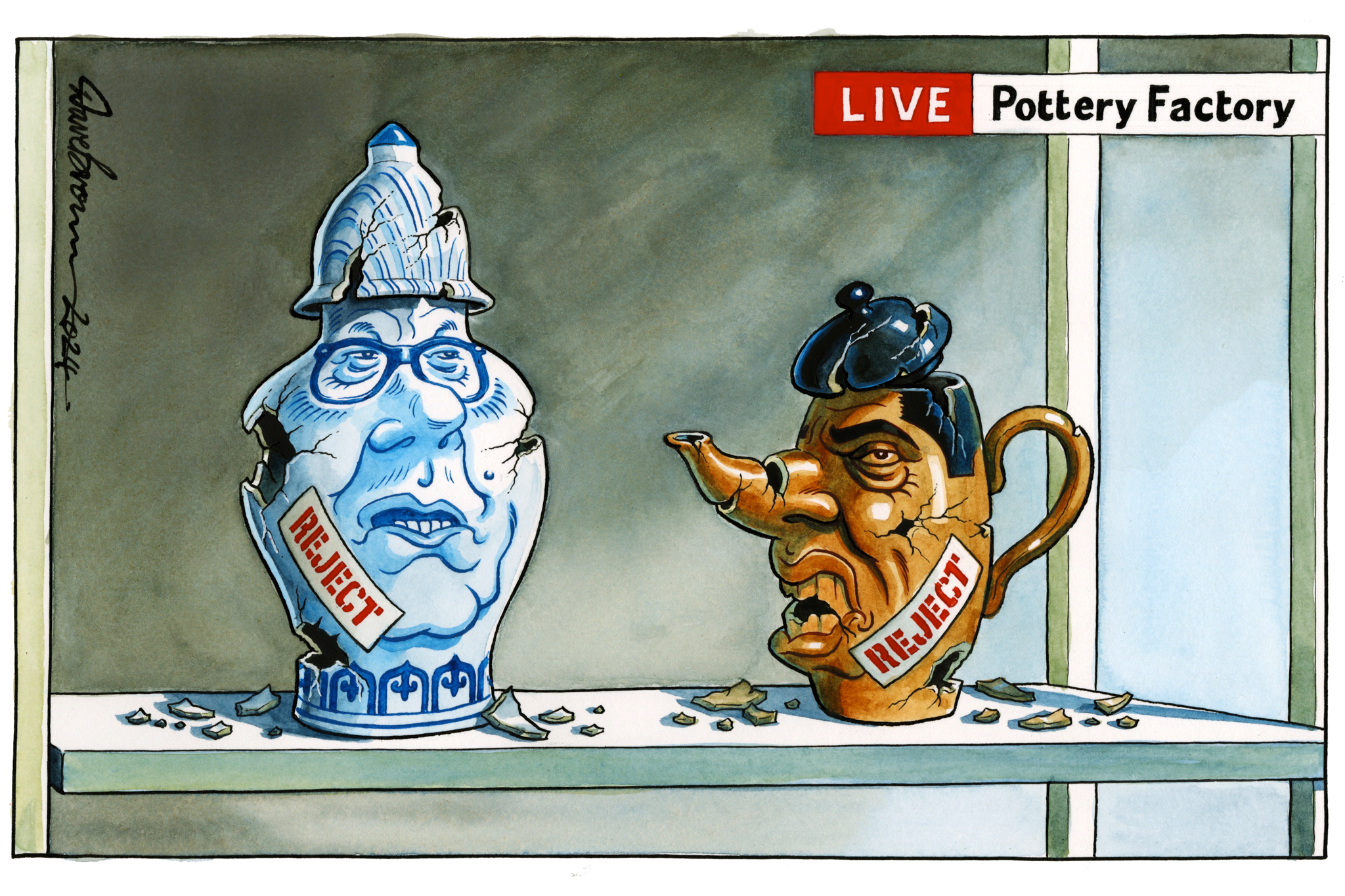It’s time to be straight with the British public
Editorial: With a week to go before polling day, the parties’ attack lines have become wearyingly familiar – yet there is also a sense that we have not heard nearly enough about how they would tackle the rumoured disasters that may soon engulf the public finances

Such seems likely to be the scale of the Tory election campaign’s failure that few will claim paternity of it. In what will inevitably be a fractious but inconclusive period of recrimination, various of those in Rishi Sunak’s inner circle will claim, with differing degrees of credibility, that they never believed that going “early” (in the sense of not continuing until the autumn, as had been expected) was wise, or that a long campaign was likely to turn around a 20 percentage-point Labour lead. No matter; the buck stops on Mr Sunak’s desk.
It is fair to say now, a week away from a new government, that the prime minister must take responsibility for what has gone wrong. It has been the worst election campaign fought by a governing party since 1945, and is on course to leave the Conservatives at their lowest ebb since the dawn of the democratic age and the passing of the Great Reform Act of 1832.
Mr Sunak cannot be blamed for everything that has gone wrong since 2010, but he was holding the baby when the music stopped. His place in history, unfortunately, looks assured.
More than most elections, then, this one has lacked much of a sense of jeopardy about the eventual result – a Labour government with an impressive majority, and a Conservative Party humiliated.
The arguments have become wearyingly familiar, and things are getting repetitive. Rather than a long campaign working to his advantage by exposing the faultlines in Labour’s policies, as Mr Sunak presumably intended, it is the Conservatives who have faced a further erosion of their support, this time to Nigel Farage and Reform UK, the only party to have made any progress since May or, indeed, the start of the year. The themes – tax, the NHS, the Tory party’s 14-year record, economic growth, housing, immigration – have remained the same since the start of hostilities, and the TV debates have been akin to trench warfare.
Paradoxically, despite the same old questions prompting the same old answers, there is a sense that neither of the major parties is being entirely straight with the public, or answering pressing questions with full candour.
The Institute for Fiscal Studies (IFS) has made the case that none of the parties – including the Liberal Democrats, the SNP, the Greens and Reform UK – have been completely honest about the hard choices that will have to be made on taxation, borrowing and public spending. It is as though the entire British political scene has been infected by the virus of “cakeism”, the political creed developed by Boris Johnson whereby the UK can uniquely enjoy European-style public services alongside American-style personal taxation.
The downside of this is that whoever was ever going to win the British general election of 2024 has failure and disappointment baked into their pie, so to speak. Something will have to give. The midterm blues will be unusually miserable, especially with a volatile electorate. As Labour and the Conservatives argue, the IFS’s gloom can be quickly dispelled by a return to the trend of GDP growth that prevailed before the global financial crisis of 2008. Yet, just as the IFS shows, it is difficult to see how the UK will become the fastest growing of the major G7 economies, as Labour promises in its manifesto; nor how, even if that were achieved, it would be enough to meet Britain’s demographic challenges, which will see an unavoidable rise in the cost of health and social care.
With seven days left until polling, there has been nowhere near enough public debate on the rumoured multiple disasters that may soon engulf the public finances; as reportedly catalogued by Sir Keir Starmer’s chief of staff, Sue Gray, these include the possible collapse of Thames Water along with that of many of our local councils and universities. As with the bank failures of 2008 and the pandemic and energy crises of 2020 to 2022, it is impossible to say exactly when and how such catastrophes might unfold, and how they might be dealt with, but they will prove expensive – costings that do not feature in the parties’ “fully funded” manifestos.
It may simply be a matter of politicians preferring not to talk about uncomfortable truths, and voters happy not to be confronted with them. But within months, much of the present debate about, for example, whether Sir Keir really wanted Jeremy Corbyn to become prime minister, and why Mr Sunak ever believed the Rwanda plan to be credible, will seem quaintly irrelevant.



Join our commenting forum
Join thought-provoking conversations, follow other Independent readers and see their replies
Comments